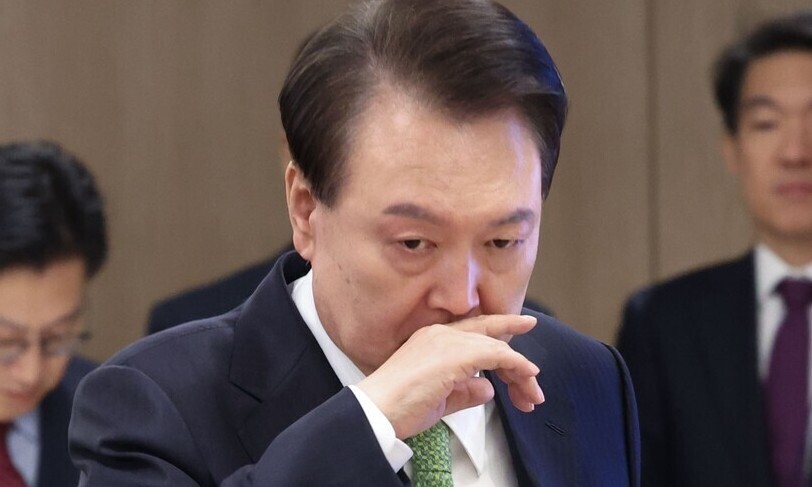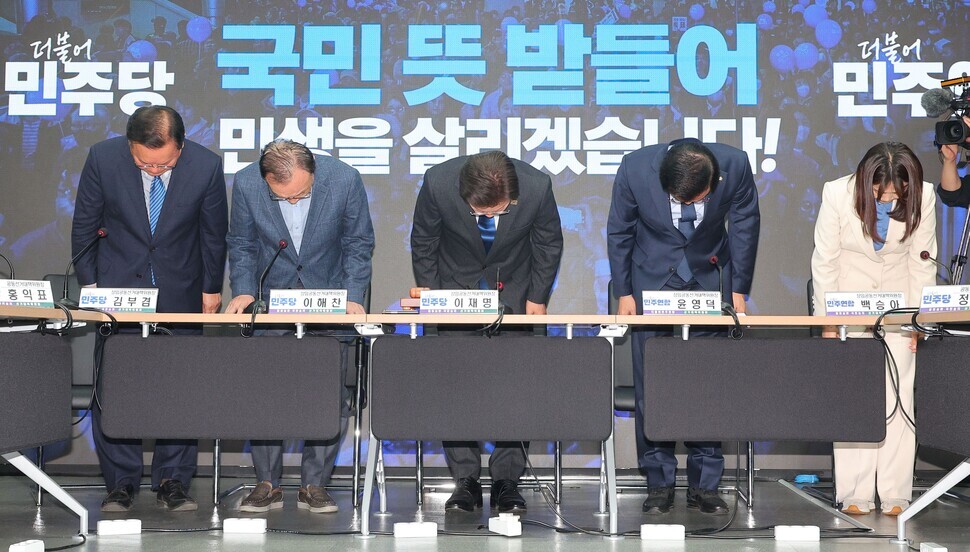hankyoreh
Links to other country sites 다른 나라 사이트 링크
‘National emergency’: Why Korean voters handed 192 seats to opposition parties

Only 108 — that’s how many seats the People Power Party won in Korea’s general elections on Wednesday, the worst showing of any ruling party since the country enacted its constitution in 1948.
Voters have shown their displeasure with ruling parties by handing the National Assembly to the opposition before, but even in such cases they’ve allowed the ruling party to keep at least 120 seats, which is enough to give the administration some basic backing.
That’s why the final tally in these general elections — 108 seats for the ruling party and 192 seats for opposition parties — appears to show that public anger at the PPP and the current administration has reached the boiling point.
“The desire for judgment against the current administration was stronger in these elections than I’ve ever seen before. Voters used the elections to punish the current administration for its incompetence and arrogance,” said Kim Yun-cheol, a professor at Humanitas College, Kyung Hee University.
These election results make a striking contest with previous elections. In 2020, the ruling Democratic Party won 180 seats, and in 2016, the ruling Saenuri Party gave up the majority to the Democratic Party (123 seats), but only came in one seat behind, at 122 seats. (The 2016 elections were held shortly before the scandal erupted that would lead to the impeachment of Park Geun-hye.)
In the 2012 elections, many expected the ruling Saenuri Party to be crushed because of public dissatisfaction with President Lee Myung-bak, but it ultimately pulled off a solid victory, winning 152 seats in the legislature. And in previous elections, the ruling party has never won fewer than 120 seats.
Considering that the Democratic Party won 180 seats in the previous general elections, its 175-seat showing this time around might suggest that support is weakening. But some take the opposition party’s victory just two years into the Yoon administration as a sign that voters think Korea is facing a serious crisis.
“The reason for the Democratic Party’s landslide victory of 180 seats during the pandemic was because the electorate wanted to give the ruling party its support in a national state of emergency. And the reason the electorate has given 192 seats to the Democratic Party and other opposition parties once again is because it considers the Yoon administration’s governance of the country as another ‘national emergency,’” said Kang Hoon-sik, a two-term lawmaker with the Democratic Party.

But at the same time, the electorate stopped short of awarding the opposition 200 seats, which has been a de facto upper limit on any one party’s dominance.
With the consent of 200 of 300 lawmakers, the National Assembly could use a constitutional amendment to shorten the president’s term in office or pass a bill of impeachment against the president for review by the Constitutional Court.
With 200 seats, the opposition could override the vetoes that Yoon has used so frequently against bills passed by the opposition-controlled National Assembly over the past two years, including the “yellow envelope bill” that would have limited employers’ rights to claim damages against striking employees.
Despite some projections shortly before the elections that opposition parties would end up with 200 seats, they came just shy of the 200-seat level required for constitutional amendments and impeachment. That appears to be a message from the electorate for both ruling and opposition lawmakers to make more use of dialogue and negotiations.
Yoon’s chief advisers — including Prime Minister Han Duck-soo and chief of staff Lee Kwan-sup — tendered their resignations on Wednesday, but some think that Yoon should immediately take bold measures such as trying a “qualitative transformation” of his relationship with the opposition party. In short, he has to find some way to reckon with the opposition’s stranglehold on the National Assembly during the final three years of his presidency, which will end in 2027.
“Politics has gone by the wayside during Yoon’s two years as president. If Yoon takes daring steps such as meeting personally with [Democratic Party] leader Lee Jae-myung and allowing the opposition party to nominate his prime minister, he will find a way forward. Another option is to propose a constitutional amendment that would shorten his term in office and give the prime minister genuine authority,” said Lee Gwan-hu, a Konkuk University’s Sang-huh College.
With 175 seats under its control, the Democratic Party must prove its competence as the main opposition party, leading the 192-seat broader opposition to counter the administration while also getting enough results to satisfy the public. While the overall election results represent a historic victory for the party, it won several nail-biters in the greater Seoul area and barely managed to win one seat in Busan. That shows that the opposition party needs to pay as much attention to public prosperity as to ideological purity.
“There were so many close races in these elections that the whole electorate can be seen as a ‘swing voter.’ Koreans seem to be asking the Democratic Party to place a check on the Yoon administration while also helping it to do a good job,” said Yoon Tae-gon, director of political analysis at think tank The Moa.
By Um Ji-won, staff reporter; Ko Han-sol, staff reporter; Noh Ji-won, staff reporter
Please direct questions or comments to [english@hani.co.kr]

Editorial・opinion
![[Column] Season 2 of special prosecutor probe may be coming to Korea soon [Column] Season 2 of special prosecutor probe may be coming to Korea soon](https://flexible.img.hani.co.kr/flexible/normal/500/300/imgdb/original/2024/0426/3317141030699447.jpg) [Column] Season 2 of special prosecutor probe may be coming to Korea soon
[Column] Season 2 of special prosecutor probe may be coming to Korea soon![[Column] Park Geun-hye déjà vu in Yoon Suk-yeol [Column] Park Geun-hye déjà vu in Yoon Suk-yeol](https://flexible.img.hani.co.kr/flexible/normal/500/300/imgdb/original/2024/0424/651713945113788.jpg) [Column] Park Geun-hye déjà vu in Yoon Suk-yeol
[Column] Park Geun-hye déjà vu in Yoon Suk-yeol- [Editorial] New weight of N. Korea’s nuclear threats makes dialogue all the more urgent
- [Guest essay] The real reason Korea’s new right wants to dub Rhee a founding father
- [Column] ‘Choson’: Is it time we start referring to N. Korea in its own terms?
- [Editorial] Japan’s rewriting of history with Korea has gone too far
- [Column] The president’s questionable capacity for dialogue
- [Column] Are chaebol firms just pizza pies for families to divvy up as they please?
- [Column] Has Korea, too, crossed the Rubicon on China?
- [Correspondent’s column] In Japan’s alliance with US, echoes of its past alliances with UK
Most viewed articles
- 1‘We must say no’: Seoul defense chief on Korean, USFK involvement in hypothetical Taiwan crisis
- 2Why Kim Jong-un is scrapping the term ‘Day of the Sun’ and toning down fanfare for predecessors
- 3After election rout, Yoon’s left with 3 choices for dealing with the opposition
- 4Two factors that’ll decide if Korea’s economy keeps on its upward trend
- 5BTS says it wants to continue to “speak out against anti-Asian hate”
- 6Gangnam murderer says he killed “because women have always ignored me”
- 7South Korea officially an aged society just 17 years after becoming aging society
- 8[Column] Park Geun-hye déjà vu in Yoon Suk-yeol
- 9Division commander ordered troops to enter raging flood waters before Marine died, survivor says
- 10No good, very bad game for Korea puts it out of Olympics for first time since 1988